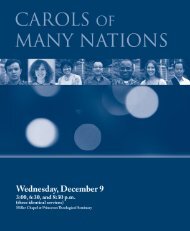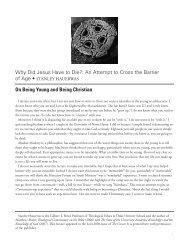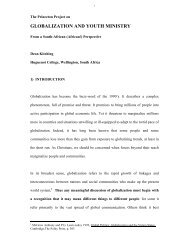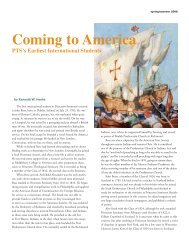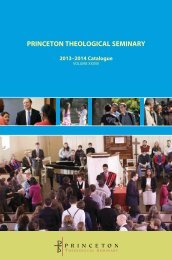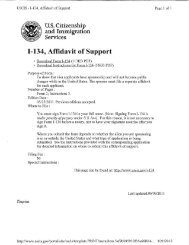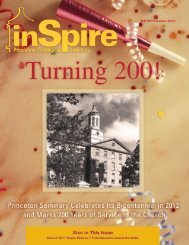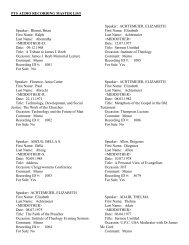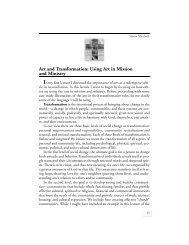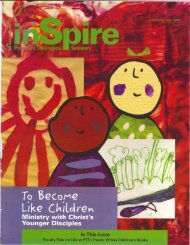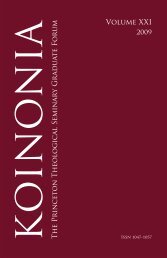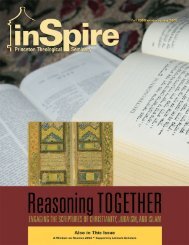P E R S P E C T I VAS - Princeton Theological Seminary
P E R S P E C T I VAS - Princeton Theological Seminary
P E R S P E C T I VAS - Princeton Theological Seminary
You also want an ePaper? Increase the reach of your titles
YUMPU automatically turns print PDFs into web optimized ePapers that Google loves.
Perspectivas/Occasional Papers • Fall 2006Perspectivas/Occasional Papers • Fall 2006decisions that impacted la comunidad. While the initial idea of amore inclusive Encuentro recognizing the plurality of cultures inthe U.S. Church was said to have come from the Hispanic AffairsCommittee there was a sense, on the part of some, that the name,process and players had been co-opted. The positive spin onEncuentro 2000 was that it reflected the hospitality of the newmajority in recognizing “the many faces in God’s house.” Thereality was that this invitation had come from the bishops of theUnited States and the faces of those with the power to extend theinvitation did not and do not reflect this new majority.The conspiracy-minded could certainly wonder how and whya process developed with Latinos/as struggling for their dueattention in the church was transformed into a poly-cultural invitationto all. Why was such an invitation unfathomable whenother ethnic groups constituted the dominant population? Whynow was it so important to provide “an opportunity for theChurch in the United States to gather, to engage in profound conversationsabout life and faith, to worship together, to learn fromeach other, to forgive one another and be reconciled, to acknowledgeour unique histories, and to discover ways in which we, asCatholic communities, can be one Church yet come from diversecultures and ethnicities.” 29 Why did the Encuentro, a gatheringand process for empowering a particular disenfranchised commu n i t y, suddenly have its focus change to “hospitality andstrengthening the unity of the Church in a cultural context.” 30What had changed? The demographics!The operational understanding of diversity and the resultingmarginalization is also evident in the current proposal to restructurethe national conference. At their June 2006 meeting, the U.S.bishops entertained a proposed restructuring plan that wouldconsolidate and/or eliminate a number of their standing committees.Among the potential victims of this plan is the HispanicAffairs Committee. The office that supports this committee88remains significantly understaffed in proportion to the Latino/apresence in the church and under the new configuration HispanicAffairs would be subsumed under a multicultural umbrella:A Committee on Culturally Diverse Communitieswould replace current standing committees onAfrican-American Catholics and Hispanic affairs andthe ad hoc committee dealing with Native AmericanCatholics. That committee would also be responsiblefor Catholics of Asian and Pacific Island descent, forwhich there is no current committee. It would haveresponsibility over the pastoral care of migrants,refugees and people on the move, which is currentlyunder the aegis of the migration committee. 31While details of the restructuring will not be voted on untilNovember 2006, concerns were raised that creating a “DiverseCulture Committee that would include all ethnic and racialgroups would perhaps diminish the need to focus even more onpastoral outreach to the Hispanic Community, which is such alarge and growing community.” 32 This was not new. In 2001 agroup of regional and national leaders in Hispanic ministry, convenedby the Hispanic Affairs Committee of the U.S. CatholicBishops, identified a set of challenges impacting the ongoingdevelopment of ministry with la comunidad latina. Theyexpressed reservations about “multicultural” models that wouldconsolidate minorities under one umbrella thus diluting the particularidentities and visions of the absorbed ethnic ministries.Articulated were concerns about a reduction of resources, limitedaccess to the bishop, exclusion of the Hispanic ministry staff frompertinent decision-making processes and the overall effect on theChurch’s ministries and mission. 33 The response of the bishops,seemingly ambivalent, in hindsight appears to have presaged therestructuring proposal: “We bishops are mindful of the cultural89



